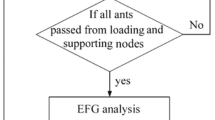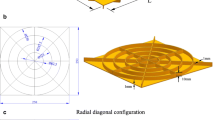Abstract
In this paper, the authors propose the use of the Lévy probability distribution as leading mechanism for solutions differentiation in an efficient and bio-inspired optimization algorithm, ant colony optimization in continuous domains, ACOR. In the classical ACOR, new solutions are constructed starting from one solution, selected from an archive, where Gaussian distribution is used for parameter diversification. In the proposed approach, the Lévy probability distributions are properly introduced in the solution construction step, in order to couple the ACOR algorithm with the exploration properties of the Lévy distribution. The proposed approach has been tested on mathematical test functions and on a real world problem of structural engineering, the composite laminates buckling load maximization. In the latter case, as in many other cases in real world problems, the function to be optimized is multi-modal, and thus the exploration ability of the Levy perturbation operator allow the attainment of better results.
Access this chapter
Tax calculation will be finalised at checkout
Purchases are for personal use only
Preview
Unable to display preview. Download preview PDF.
Similar content being viewed by others
References
Herrera, F., Lozano, M., Verdegay, J.L.: Tackling real-coded genetic algorithms: Operators and tools for behavioural analysis. Artificial Intelligence Review 12, 265–319 (1998)
Back, T.: Evolution Strategies: an alternative evolutionary algorithm. Artificial Evolution 1063, 3–20 (1995)
Dorigo, M.: Optimization, learning and natural algorithms (in Italian). PhD thesis, Dipartimento di Elettronica, Politecnico di Milano, Italy (1992)
Dorigo, M., Gambardella, L.M.: Ant colony System: A cooperative learning approach to the traveling salesman problem. IEEE Trans. on Evol. Comp. 1(1), 53–66 (1997)
Socha, K., Dorigo, M.: Ant colony optimization for continuous domains. European Journal of Operational Research 185, 1155–1173 (2008)
Lee, C., Yao, X.: Evolutionary programming using mutations based on Lévy probability distribution. IEEE Trans. on Evol. Comp. 8(1), 1–13 (2004)
Gutowski, M.: Lévy flights as an underlying mechanism for global optimization algorithms. Math-ph/0106003 (2001), http://arxiv.org/pdf/math-ph/0106003
Gurdal, Z., Haftka, R.T.: Optimization of composite laminates. In: NATO Advanced Study Institute on Optimization of Large Structural Systems, Germany (1991)
Soremekun, G., Gurdal, Z., Haftka, R.T., Watson, L.T.: Composite laminate design optimization by genetic algorithm with generalized elitist selection Computers and Structures 79, 131–143 (2001)
Erdal, O., Sonmez, F.O.: Optimum design of composite laminates for maximum buckling load capacity using simulated annealing Composite Structures 71, 45–52 (2005)
Karakaya, S., Soyksap, O.: Buckling optimization of laminated composite plates using genetic algorithm and generalized pattern search algorithm. Struct. Multidisc. Optim. 39, 477–486 (2009)
Lévy, P.: Théorie des erreurs la loi de Gauss et les lois exceptionnelles. Bulletin de la Société Mathématique de France 52, 49–85 (1924)
Samorodnitsky, G., Taqqu, M.S.: Stable non-Gaussian random processes: Stochastic models with infinite variance. Chapman and Hall, New York (1994)
Grigoriu, M.: Stochastic Calculus Applications in Science and Engineering. Birkhäuser, Boston (2002)
Reddy, J.N.: Mechanics of Laminated Composite Plates and Shells, 2nd edn. CRC press, Boca Raton (2004)
Author information
Authors and Affiliations
Editor information
Editors and Affiliations
Rights and permissions
Copyright information
© 2010 Springer-Verlag Berlin Heidelberg
About this paper
Cite this paper
Candela, R., Cottone, G., Fileccia Scimemi, G., Riva Sanseverino, E. (2010). Composite Laminates Buckling Optimization through Lévy Based Ant Colony Optimization. In: García-Pedrajas, N., Herrera, F., Fyfe, C., Benítez, J.M., Ali, M. (eds) Trends in Applied Intelligent Systems. IEA/AIE 2010. Lecture Notes in Computer Science(), vol 6097. Springer, Berlin, Heidelberg. https://doi.org/10.1007/978-3-642-13025-0_31
Download citation
DOI: https://doi.org/10.1007/978-3-642-13025-0_31
Publisher Name: Springer, Berlin, Heidelberg
Print ISBN: 978-3-642-13024-3
Online ISBN: 978-3-642-13025-0
eBook Packages: Computer ScienceComputer Science (R0)




